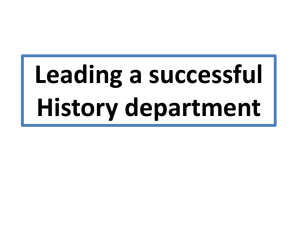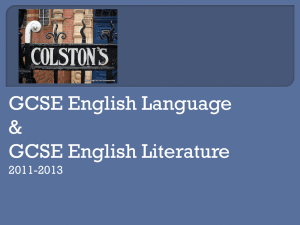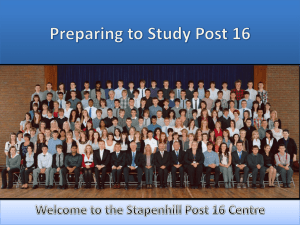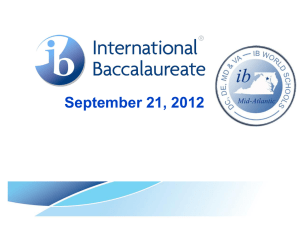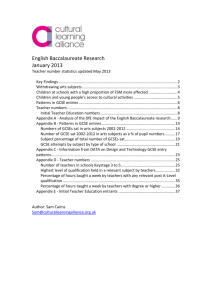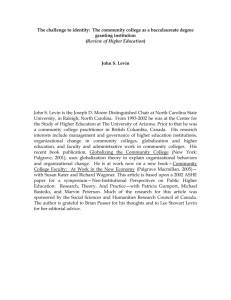History - Teignmouth Community School
advertisement
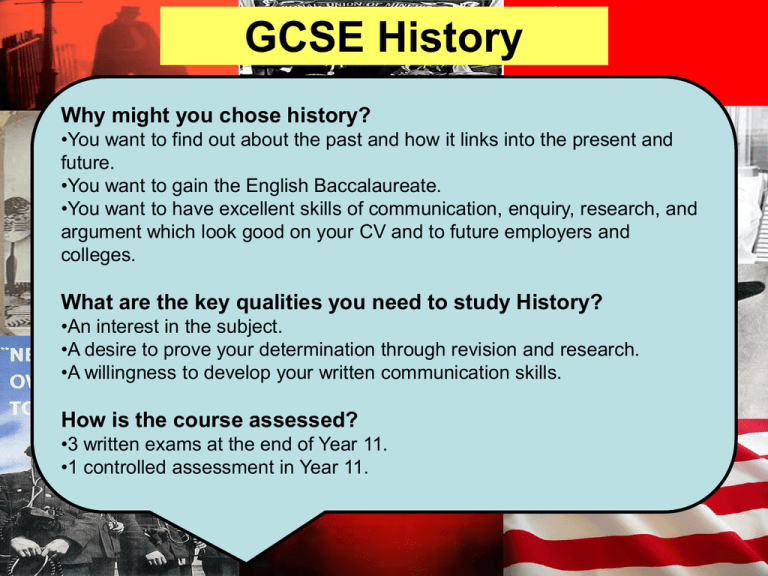
GCSE History Why might you chose history? •You want to find out about the past and how it links into the present and future. •You want to gain the English Baccalaureate. •You want to have excellent skills of communication, enquiry, research, and argument which look good on your CV and to future employers and colleges. What are the key qualities you need to study History? •An interest in the subject. •A desire to prove your determination through revision and research. •A willingness to develop your written communication skills. How is the course assessed? •3 written exams at the end of Year 11. •1 controlled assessment in Year 11. GCSE History aims to help you to acquire much more than knowledge of the past. It aims to enable you to develop skills which prepare you to perform, either in the work place, or at a higher level of education. While acquiring a knowledge of the past is important in itself, the study of this subject will also enable you to assess the significance of past events so that you can connect them with the present. The course will help you to do this with the following units: Modular Examinations Unit 1: Peace and War: International Relations 1900-91 •Section 4: Why did the Cold War develop? 1943-56 •Section 5: Three Cold War crises: Berlin, Cuba, Czechoslovakia c1957-69 •Section 6: Why did the Cold War end? The invasion of Afghanistan (1979) to the collapse of the Soviet Union (1991) Unit 2 The USA 1919-41 Unit 3 War and the Transformation of British Society 1931-51 Controlled Assessment Unit 4 British History •Crime, policing and protest in England c1880-c1990 Why have we chosen these units? At TCS we aim to help our students to acquire a genuine breadth of knowledge. GCSE provides a clear sweep of modern world and European history. It aims to provide students with a secure understanding of selected periods of history ranging the nineteenth and twentieth centuries. Unit 1: Peace and War International Relations The development of the Cold War between 1943 and 1991 Have you ever wondered why today’s world is dominated by America which stands as the only remaining superpower? This course will enable students to answer this question by investigating the development of two superpowers which dominated the second half of the twentieth century; specifically, the USA and the USSR. The course considers how the nuclear arms race came about. It explores how hostilities between the two powers would dominate global politics, at one time bringing the world to the brink of World War III with the Cuban Missile Crisis. Students will also investigate the causes of the collapse of the Soviet Union and how this has shaped the political world in which we live today. This unit focuses on European politics after the Second World War and links with the wider world. The Nuclear Arms Race Unit 2: The USA 1919-41 Al Capone This unit focuses on America’s problems during the early twentieth century. Is the early twenty-first century the first time that we have experienced a financial crisis? The simple answer is no. This unit explores a time when America was experiencing financial disaster. From boom to bust students investigate the causes of America’s problems. How did ordinary Americans move from the good times and glad rags of the Roaring Twenties to living in cardboard boxes. This period of History considers life in the twenties, from new fashions, music and films, to the gangster of the age, Al Capone, organised crime and prohibition. Students will ask why the good times came to an end with the onset of the Depression era and how the American government attempted to deal with the crisis. Unit 3 War and the transformation of British Society What was Britain’s role in World War II? How was Britain effected by the Blitz? This unit examines ways in which Britain was involved in World War II and how this shaped the country afterwards. Students will also study the Depression in the 1930s, Britain at war, the home front between 1939-45 and the new Labour government from 1945-51. This unit focuses on Britain during and after World War 2. Malcolm X Brixton Riots Unit 4: British History Crime, policing and protest in England c1880-c1990 This unit explores the changing nature of crime, policing and protest between the nineteenth and twentieth centuries. What have Jack the Ripper, Dr Crippen, the IRA and the Brixton Riots got in common? They all had to be policed in some way shape or form. This unit considers the nature of crime, policing and protest since the nineteenth century. Students will explore questions concerning the changing nature of crime and how it is tackled. The development of forensic science, the death penalty and prison reform will be set against a range of case studies such as Jack the Ripper, Dr Crippen, terrorism (the IRA), the Miners’ Strike and the Brixton Riots. History and your future – The English Baccalaureate The new government has placed great value on the subject of History. This is a clear message that has been sent to employers and colleges. History GCSE is to be seen as the Gold Standard of Achievement for 16 year olds. Therefore many institutions and employers will be looking for this qualification to assess whether they want you or not. You will have the opportunity to receive an additional gold standard qualification, simply by choosing History as one of your humanities subjects. Those students who have achieved a grade A*-C in a humanities, MFL, English, Science and Maths will also be awarded an English Baccalaureate. This is a clear message from the government about what is important – it is no longer just English and Maths. Receiving the English Baccalaureate not only makes you more desirable to employers and colleges in England, it also means that you can compete on an international scale with those who have achieved the International Baccalaureate abroad. When you are applying for jobs and positions in further education you will be competing with students who do have the English Baccalaureate from your own year group and those in the years below you. In a generation which is facing harsh economic conditions, it is vital that you ensure you stand out as the most desirable and qualified candidate for what you wish to pursue. History clearly indicates that you have qualities of determination, commitment, focus, independence and initiative; all of which demonstrate that you can rise to a challenge. These are the very same qualities that employers and colleges are looking for. 5 GCSE A*-Cs is no longer enough – there is further emphasis on what you have studied. You will be expected to bridge the gap between the demands of lower school and the demands of GCSE. This will involve greater responsibility and independent learning on your part. The help, guidance and support of your subject teachers is always on offer, but not everything can be achieved in the classroom; it is but one part of your learning. So what must you do to ensure your success? The most important one of all – HOME LEARNING! Since all learning cannot take place in the classroom, home learning is a crucial part of your progress at GCSE standard. Completion of homework is hugely important to the your achievement, and that of the group. Revision is an absolute must. This course contains a range of content that you must remember for the examinations. If you are going to succeed in this subject you must be prepared to work hard at home. Independent research History expects that you widen your general knowledge as you study. Read around the subject material that you are covering in class. You will be required to present information, not provided in lessons, in your written work. Watching and reading about the news is another way of widening your general knowledge. Reading in general History is a written subject. You are expected to write at length and in detail. Your ability is examined according to your ability to express your ideas on paper. If you are to succeed you must expect reading and recording material to be a key part of your studies. Attendance Attendance at every lesson is a fundamental requirement of the course. Success in this subject hinges on an understanding of a wide range of content. If you miss lessons, you will miss part of the story of the past. It is always more difficult to gain a secure understanding if you have created holes in the story. The History Department at TCS is committed to your progress and achievement. To this end the History Department will provide the following: •specially crafted lesson materials which are aimed at the learning of your group; •clear feedback about your written work, examination performance and general progress; •a Parent and Student Guide offering step by step advice about how to succeed in History; •revision materials; •revision lessons; •revision sessions after school. If you have any particular problems or issues, or simply require further advice, your teachers will take the time to sit down with you and provide strategies and direction. History teaches us about our past, so that we understand the world we live in now… How to make sense of what you see on the news. How to analyse information. History helps you to understand how and why change comes about. How to produce an argument worth listening to! How to interpret information. Research skills. How to recognise links between causes and effects. Written skills We can learn from the mistakes that people have made in the past AND from the successes! History is important for many careers. A History qualification proves to employers and colleges that you have excellent written skills, can process information and that you are capable of independent research and thought. This is extremely important for students who wish to secure a good career. There are many exciting careers that History can lead onto… •Lawyer •Journalist •TV Presenter •Archaeologist •Politician •Social Policy Researcher •Film writing and producing – you could be involved in making the next ‘Gladiator’! •Civil Service •Police •Television production and research All of these famous people studied History… Sacha Baron Cohen (Ali G, Borat): Comedian Louis Theroux: Broadcaster Ed Simons: The Chemical Brothers Gordon Brown: Previous Prime Minister


